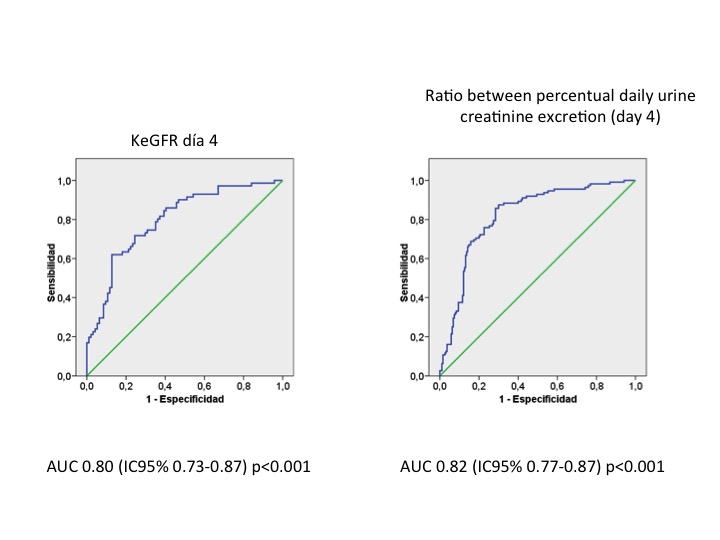Kinetic Estimation of Glomerular Filtration Rate and Urine Creatinine as Predictors of Delayed Graft Function in Kidney Transplantation from Non-Heart Beating Donors.
Nephrology, Hospital Clínico San Carlos, Madrid, Spain
Meeting: 2017 American Transplant Congress
Abstract number: A196
Keywords: Glomerular filtration rate (GFR), Graft function, Urinalysis
Session Information
Session Name: Poster Session A: Kidney Complications I
Session Type: Poster Session
Date: Saturday, April 29, 2017
Session Time: 5:30pm-7:30pm
 Presentation Time: 5:30pm-7:30pm
Presentation Time: 5:30pm-7:30pm
Location: Hall D1
Predicting the occurrence of delayed graft function (DGF) and its duration can facilitate the management of patients after kidney transplantation (KT). Methods: A retrospective study of the first post-transplantation month was performed on a prospective cohort of typeII Maastricht kidney transplant patients that received their grafts between2005-2015. Graft loss during the early post-transplantation period were excluded, remaining a valid sample of 368 patients. The kinetic estimation of glomerular filtration rate (KeGFR) was based on creatinine concentrations, estimated creatinine production, distribution volume and differences between consecutive creatinine values, according to the formula given by Chen et al. Urine creatinine and sodium excretion were studied. Also, we have calculated the estimated creatinine excretion by Ix equation and the ratio between the percentual daily urine creatinine excretion and the estimated creatinine excretion rate (%excretion_creatinine). Results: The median period of time to onset of decrease in creatinine levels was of 17 days (IQR 12-22). 69.6% required dialysis after KT. A correlation was found between the duration of DGF and both total urine creatinine excretion(r=0.418 day1, r=0.500 day2, r=0.546 day3) and all determinations of KeGFR(r=0.402 day1, r=0.431 day2, r=0.490 day3).The parameters that reached the best correlation were KeGFR at the fourth day [DGF duration(days) =20.9-0.749xKeGFRday4, r=0.515; p<0.001] and %excretion_creatinine at the fourth day (DGF (days)=22.6-0.117x% excretion_creatinine, r=0.584; p<0.001). KeGFR being more specific and % excretion_creatinine being more sensitive. Conclusions: Determination of both KeGFR and the ratio between percentual daily urine creatinine excretion and estimated creatinine excretion rate in the early post-KT period can be effective tools to predict the duration of DGF and aid in the management of patients who receive a KT from non-heart beating donors.
Conclusions: Determination of both KeGFR and the ratio between percentual daily urine creatinine excretion and estimated creatinine excretion rate in the early post-KT period can be effective tools to predict the duration of DGF and aid in the management of patients who receive a KT from non-heart beating donors.
CITATION INFORMATION: Calvo M, Moreno De La Higuera M, Lopez De La Manzanara V, Shabaka A, Poma M, Perez-Flores I, Calvo Romero N, Rodríguez-Cubillo B, Sanchez-Fructuoso A. Kinetic Estimation of Glomerular Filtration Rate and Urine Creatinine as Predictors of Delayed Graft Function in Kidney Transplantation from Non-Heart Beating Donors. Am J Transplant. 2017;17 (suppl 3).
To cite this abstract in AMA style:
Calvo M, Shabaka A, Poma M, Perez-Flores I, Romero NCalvo, Rodríguez-Cubillo B, Sanchez-Fructuoso A. Kinetic Estimation of Glomerular Filtration Rate and Urine Creatinine as Predictors of Delayed Graft Function in Kidney Transplantation from Non-Heart Beating Donors. [abstract]. Am J Transplant. 2017; 17 (suppl 3). https://atcmeetingabstracts.com/abstract/kinetic-estimation-of-glomerular-filtration-rate-and-urine-creatinine-as-predictors-of-delayed-graft-function-in-kidney-transplantation-from-non-heart-beating-donors/. Accessed February 16, 2026.« Back to 2017 American Transplant Congress
